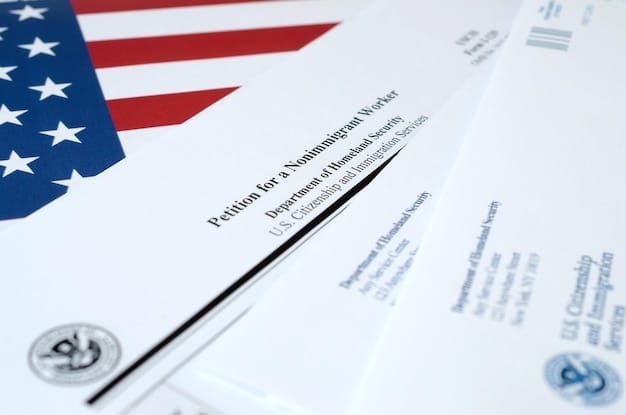Decoding International Flight Compensation: US Passenger Rights in 2025

Decoding International Flight Compensation: Know Your Rights as a US Passenger in 2025 is essential for travelers to understand the protections afforded to them when international flights face delays, cancellations, or other disruptions, ensuring they can seek rightful compensation.
Navigating the world of international air travel can be exciting, but it also comes with the potential for disruptions. Understanding your rights regarding flight compensation is crucial. Let’s delve into decoding international flight compensation: Know Your Rights as a US Passenger in 2025, ensuring you’re prepared and informed.
Understanding International Flight Compensation
When your international flight experiences a hiccup, knowing your compensation rights becomes paramount. This section breaks down the basics of flight compensation, setting the stage for understanding what you’re entitled to as a US passenger.
Delays, cancellations, and denied boarding can throw a wrench in your travel plans. But did you know that in many cases, you’re entitled to compensation? Let’s explore the world of international flight compensation.
What is Flight Compensation?
Flight compensation refers to the money or other benefits that airlines are required to provide to passengers when their flights are disrupted due to reasons within the airline’s control.
Why is it Important to Know Your Rights?
Knowing your rights ensures that you are treated fairly and receive the compensation you deserve when airlines fail to uphold their end of the bargain. Understanding the intricacies of flight compensation can empower passengers when dealing with flight disruptions.
- Airlines have a legal obligation to inform passengers of their rights.
- Compensation can cover expenses like meals, accommodation, and even financial reimbursement.
- Different regulations apply depending on the origin and destination of the flight.
Understanding the basics of flight compensation is only the beginning. Let’s dive deeper into specific regulations and how they affect US passengers in 2025.
Key Regulations Affecting US Passengers
Several key regulations govern international flight compensation, directly impacting US passengers. Understanding these regulations is essential for navigating the system effectively. This section outlines the primary frameworks that protect your rights.
As a US passenger, your rights on international flights are protected by a combination of international agreements and US regulations. Let’s examine the key regulations affecting US passengers in 2025.
The Montreal Convention
The Montreal Convention is an international treaty that establishes airline liability in cases of death or injury to passengers, as well as for baggage loss or damage and delays. This rule provide the foundation on which passenger’s flight compensation is based and paid
US Department of Transportation (DOT) Regulations
The US DOT has specific regulations regarding airline consumer protection, including requirements for airlines to compensate passengers for certain flight disruptions.

- Airlines must provide prompt refunds for cancelled flights.
- Passengers are entitled to compensation for denied boarding due to overbooking.
- Airlines must disclose flight delays and cancellations in a timely manner.
These regulations provide a strong framework for protecting US passengers on international flights. Next, let’s explore the specific scenarios in which you’re entitled to compensation.
When Are You Entitled to Compensation?
Not all flight disruptions qualify for compensation. This section clarifies the specific circumstances under which US passengers are entitled to receive compensation for international flight issues.
Knowing when you’re entitled to compensation is crucial for seeking what you deserve. Here are the most common scenarios where US passengers are eligible for flight compensation:
Flight Delays
If your flight is significantly delayed due to reasons within the airline’s control (e.g., mechanical issues, staffing problems), you may be entitled to compensation.
Flight Cancellations
When an airline cancels your flight, you are typically entitled to a refund or rebooking on an alternative flight. In some cases, you may also be eligible for additional compensation.
Denied Boarding (Overbooking)
If you are denied boarding due to overbooking, the airline must compensate you, provided you have complied with check-in deadlines and have a valid ticket.
- Compensation amounts vary depending on the length of the delay or the distance of the flight.
- Airlines are not obligated to compensate passengers for disruptions caused by extraordinary circumstances (e.g., weather, political instability).
- Documenting the cause and length of the disruption is crucial for filing a successful claim.
Understanding these specific scenarios can help you determine if you’re eligible for compensation. Now, let’s examine the steps to take when seeking rightful compensation.
Steps to Take to Claim Compensation
Claiming flight compensation involves specific steps and documentation. This section provides a clear guide to the process, helping you navigate it effectively and maximize your chances of success.
Filing a claim for flight compensation can seem daunting, but following these steps can simplify the process for US passengers:
Document Everything
Keep records of your flight details, boarding pass, any communication with the airline, and receipts for expenses incurred due to the disruption. This includes details of your international flight.
Contact the Airline
Start by contacting the airline’s customer service department to file your claim. Be polite but assertive, clearly stating your reasons for seeking compensation.
File a Formal Complaint
If the airline denies your claim or fails to respond in a reasonable timeframe, file a formal complaint with the US Department of Transportation (DOT).

- Be prepared to provide all necessary documentation to support your claim.
- Keep a record of all communication with the airline and the DOT.
- Consider seeking assistance from a passenger rights organization if needed.
By following these steps diligently, you can increase your chances of receiving the compensation you deserve. Let’s now discuss the common pitfalls to avoid when claiming compensation.
Common Pitfalls to Avoid
Navigating the flight compensation process can be tricky, and certain mistakes can hinder your claim. This section highlights common pitfalls to avoid, ensuring a smoother and more successful process.
When seeking flight compensation, avoiding these common mistakes can significantly improve your chances of success as a US passenger:
Failing to Document Thoroughly
Incomplete or inaccurate documentation can weaken your claim. Ensure you have all necessary records, including receipts and communications.
Missing Deadlines
Many regulations have deadlines for filing claims. Missing these deadlines can result in your claim being denied.
Accepting Initial Offers Without Understanding Your Rights
Airlines may offer initial compensation that is less than what you’re entitled to. Understand your rights and negotiate for fair compensation from your international flight.
- Be wary of accepting vouchers or credits that may have limited validity or restrictions.
- Don’t be afraid to escalate your claim if you believe you’re not being treated fairly.
- Seek legal advice if you encounter significant challenges in obtaining compensation.
Avoiding these pitfalls will help you navigate the compensation process more effectively. Finally, let’s look ahead to potential future changes in passenger rights.
Future Trends in Passenger Rights (Looking Ahead to 2025)
The landscape of passenger rights is continuously evolving. This section explores potential future trends and changes that could impact US passengers in 2025 and beyond.
Looking ahead to 2025, several trends could shape the future of passenger rights and flight compensation for US passengers:
Enhanced Consumer Protection
Increased regulatory scrutiny and advocacy efforts may lead to усиленными consumer protection measures, providing passengers with stronger rights and remedies.
Technological Advancements
Technological innovations, such as automated compensation systems and real-time flight tracking, could streamline the claims process and improve transparency.
International Cooperation
Greater cooperation among international regulators could lead to more uniform standards for passenger rights and compensation across different regions.
- Stay informed about any regulatory changes or updates that may affect your rights.
- Support advocacy efforts aimed at strengthening passenger protections.
- Take advantage of technological tools and resources that can help you navigate flight disruptions.
By staying informed and proactive, you can ensure that you’re well-prepared to navigate the evolving landscape of passenger rights. Being aware of these trends can maximize your opportunities to claim flight compensation from your international flight.
| Key Aspect | Brief Description |
|---|---|
| ✈️ Flight Delays | Compensation is possible for significant delays within airline control. |
| ⚠️ Flight Cancellations | Entitled to a refund or rebooking; additional compensation may apply. |
| 🚫 Denied Boarding | Compensation is required for overbooking if check-in deadlines are met. |
| 📝 Documentation | Keep all flight details, receipts, and communication with the airline. |
Frequently Asked Questions (FAQ)
▼
A significant delay is typically considered to be 3 hours or more. The exact definition can vary based on the specific regulations and the distance of your flight.
▼
Yes, under certain regulations, airlines must provide meals, refreshments, and accommodation if you are stranded due to a significant delay, especially overnight.
▼
Extraordinary circumstances include events like severe weather, political instability, security risks, or strikes by air traffic control, which are beyond the airline’s control.
▼
The time limit for filing a claim can vary, but it’s generally advisable to file your claim as soon as possible after the disruption, ideally within a few months.
▼
Yes, if the delay in your connecting flight causes you to miss your onward flight and arrive at your final destination late, you may be eligible for compensation.
Conclusion
Understanding your rights as a US passenger regarding international flight compensation is essential in 2025. By knowing the key regulations, eligible scenarios, and steps to take, you can navigate flight disruptions with confidence and seek the compensation you deserve, ensuring a smoother travel experience.





